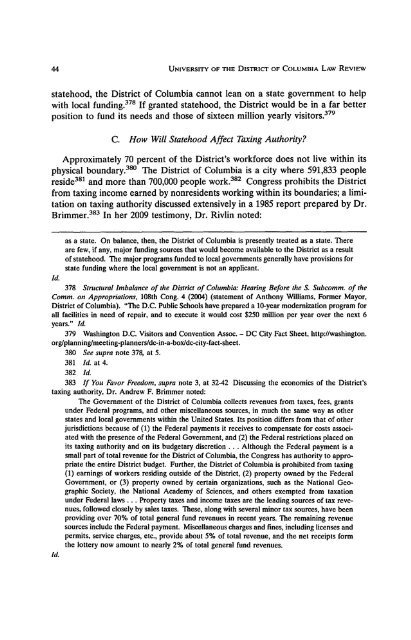Download - UDC Law Review
Download - UDC Law Review
Download - UDC Law Review
Create successful ePaper yourself
Turn your PDF publications into a flip-book with our unique Google optimized e-Paper software.
44 UNIVERSITY OF THE DISTRICT OF COLUMBIA LAW REVIEWstatehood, the District of Columbia cannot lean on a state government to helpwith local funding. 378 If granted statehood, the District would be in a far betterposition to fund its needs and those of sixteen million yearly visitors. 379C. How Will Statehood Affect Taxing Authority?Approximately 70 percent of the District's workforce does not live within itsphysical boundary.38o The District of Columbia is a city where 591,833 peoplereside 381 and more than 700,000 people work. 382 Congress prohibits the Districtfrom taxing income earned by nonresidents working within its boundaries; a limitationon taxing authority discussed extensively in a 1985 report prepared by Dr.Brimmer.383 In her 2009 testimony, Dr. Rivlin noted:as a state. On balance, then, the District of Columbia is presently treated as a state. Thereare few, if any, major funding sources that would become available to the District as a resultof statehood. The major programs funded to local governments generally have provisions forstate funding where the local government is not an applicant.Id.378 Structural Imbalance of the District of Columbia: Hearing Before the S. Subcomm. of theComm. on Appropriations, 108th Congo 4 (2004) (statement of Anthony Williams, Former Mayor,District of Columbia). "The D.C. Public Schools have prepared a 10-year modernization program forall facilities in need of repair, and to execute it would cost $250 million per year over the next 6years." Id.379 Washington D.C. Visitors and Convention Assoc. - DC City Fact Sheet, hUp:!lwashington.orglplanninglmeeting-planners/dc-in-a-boxldc-city-fact-sheet.380 See supra note 378, at 5.381 Id. at 4.382 Id.383 If You Favor Freedom, supra note 3, at 32-42 Discussing the economics of the District'staxing authority, Dr. Andrew F. Brimmer noted:The Government of the District of Columbia collects revenues from taxes, fees, grantsunder Federal programs, and other miscellaneous sources, in much the same way as otherstates and local governments within the United States. Its position differs from that of otherjurisdictions because of (1) the Federal payments it receives to compensate for costs associatedwith the presence of the Federal Government, and (2) the Federal restrictions placed onits taxing authority and on its budgetary discretion ... Although the Federal payment is asmall part of total revenue for the District of Columbia, the Congress has authority to appropriatethe entire District budget. Further, the District of Columbia is prohibited from taxing(1) earnings of workers residing outside of the District, (2) property owned by the FederalGovernment, or (3) property owned by certain organizations, such as the National GeographicSociety, the National Academy of Sciences, and others exempted from taxationunder Federal laws ... Property taxes and income taxes are the leading sources of tax revenues,followed closely by sales taxes. These, along with several minor tax sources, have beenproviding over 70% of total general fund revenues in recent years. The remaining revenuesources include the Federal payment. Miscellaneous charges and fines, including licenses andpermits, service charges, etc., provide about 5% of total revenue, and the net receipts formthe lottery now amount to nearly 2% of total general fund revenues.Id.














